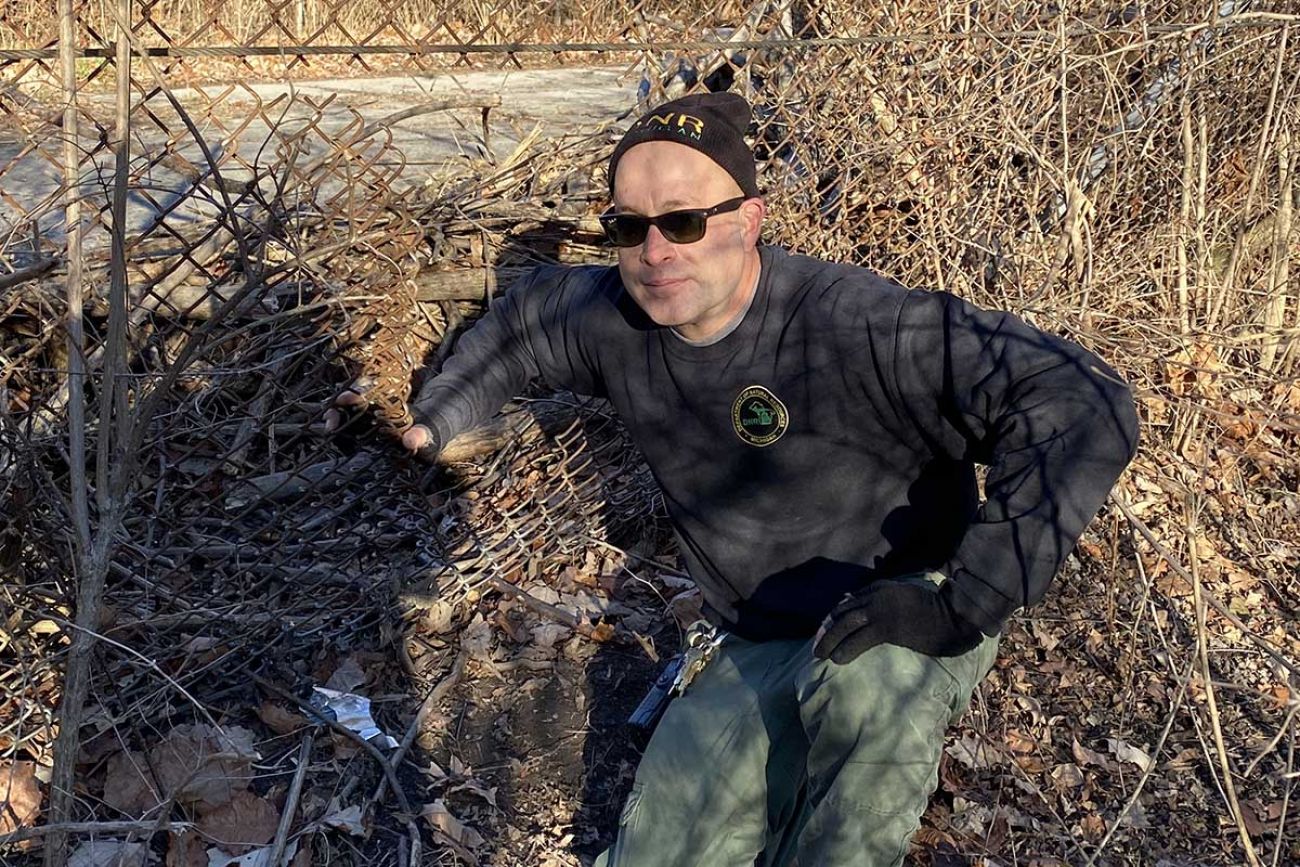Michigan essential workers get free tuition. Soon, many others can, too.

Nov. 1: Free tuition lured Michigan adults to college. Next job: Keeping them there
Todd Schultz recalls how stressful it was to work during the scary, confusing weeks in the spring of 2020 as the new coronavirus first battered Michigan.
As a state-employed park ranger working on Belle Isle in Detroit, Schultz was considered an “essential worker” when many of Michigan’s businesses were ordered closed by Gov. Gretchen Whitmer to try to stem the spread of COVID-19.
People were urged to stay home and avoid socializing, but told they could go outside for exercise, and Belle Isle was jammed with people, many not wearing masks.
Related:
“You had people who were complying and some who weren’t,” said Schultz, who is 48. “You had to make sure you were socially distancing and make sure you were safe to and from your home for work. It was definitely stressful.”
Today, the Oakland County resident is preparing to go to community college for free, through a state program aimed at thanking frontline workers like him.
The Futures for Frontliners program, announced in April and formalized in September, gives Michigan residents who worked frontline jobs during the peak of the pandemic from April to June access to free community college or high school completion.
The program’s been a resounding success — more than 60,000 people signed up in the first two weeks and 120,000 by the Dec. 31 deadline. That’s almost 20 percent of the estimated 625,000 essential workers who were eligible.
The Frontliners program may be just the beginning. Soon, Michigan residents aged 25 to 64 who do not already have a college degree will be able to go to community college for free.
Michigan Reconnect offers free community college or job certification programs to state residents age 25 and older. The $30-million program was approved and funded last year, but put on hold because of budgetary concerns during the pandemic.
Now, the state is gearing up to formally launch the program. Michigan Reconnect is expected to open for applications soon. There are about 3 million Michigan residents in that age range who do not have at least an associate’s degree, according to Census data. Many of the 120,000 who applied for the Futures for Frontliners program are among those 3 million.
The two free college programs could be economic game-changers. Michigan is below the national average in the percentage of adults with college degrees, which hobbles the state’s attempts to attract business and suppresses income.
More education typically means higher salaries. Nationally, high school grads earned, on average, $38,792 in 2019, compared to $46,124 for those with an associate’s degree and $64,896 for those with a bachelor’s degree, according to data from the U.S Bureau of Labor Statistics.
Incomes for a lot of essential workers, many of whom do not have college degrees, is even worse. A recent federal Bureau of Labor Statistics report on essential work showed that cashiers, for example, earned just 40 percent of the average income for those with high school degrees; janitor wages were 69 percent, while stock and general laborers, such as in warehouse jobs, were paid about 74 percent of that full-time average.
Some low-wage workers eligible for the programs likely are already eligible to attend free community college, by using federal Pell grants, which cover up to $6,195 a year for students in families with adjusted gross incomes of $26,000 or less. Students earning up to $60,000 qualify for smaller Pell grants.
The Futures for Frontliners grants will pay only for the community college tuition not covered by Pell grants.
Even if some essential workers could have already gone to community college for free, many didn’t know such benefits were possible until the Futures for Frontliners program was promoted last year, said Ryan Fewins-Bliss, executive director of the Michigan College Access Network, a group that works to increase college enrollment among low-income and first-generation students.
“Every time you turn on the TV, some talking head is saying college is too expensive,” Fewins-Bliss told Bridge Michigan in September. “Low-income folks hear that loud and clear and believe they can’t afford it.”
The same can be said of Michigan Reconnect, Fewins-Bliss said. The two programs “change the conversation around the dinner table. The publicity of telling folks there is a pathway for them, changes the mindset for them.”
The Futures for Frontliners program was a major initiative of the Whitmer administration in 2020. “Our frontline workers put their lives on the line every day to provide crucial support to Michiganders during this pandemic, and they deserve support long after this crisis is over,” Whitmer said in a statement to Bridge Michigan. “This initiative is not only a way to say, ‘thank you,’ it’s an opportunity to provide a pathway to better paying jobs.”
Michigan Reconnect is likely to be popular, considering the level of excitement about Futures for Frontliners.
Erica Quealy, spokesperson for the Michigan Department of Labor and Economic Opportunity, said the 120,000 Frontliners applications were “beyond expectations.”
“It was a good indicator that people are actively seeking” to advance their education, Quealy said.
Frontline workers who qualified ranged from grocery shelf stockers and sanitation employees to health care and critical manufacturing workers. You can see a complete list here.
Of those 120,000 applications, about 82,000 have already been approved, Quealy said. Some who didn’t qualify because they didn’t work enough weeks during the lockdown to meet program requirements will be encouraged to apply for free community college tuition through Michigan Reconnect when it is up and running, Quealy said.
About half the essential workers who applied to the Frontliners program were already taking college/community college classes before the program was announced. Others, including Schultz the park ranger, were motivated to start or return to campus after hearing publicity about the program.
The program is a win not only for students, but for community colleges, which have suffered enrollment declines during the pandemic.
At Lansing Community College, 1,200 students are enrolled in the winter semester through the Futures for Frontliners program. About half were enrolled in the fall, 25 percent re-enrolled after stopping taking classes, and 25 percent had never taken college courses.
Those 1,200 students represent more than 10 percent of the schools’ roughly 11,000 students. “It’s been a silver lining among a lot of challenges,” said Gary King, associate dean at the Center for Academic and Career Pathways at LCC.
At Grand Rapids Community College, 2,893 people were accepted to the school through the essential worker program, and 1,634 are currently enrolled. Among those enrolled, a third (559) weren’t taking classes in the fall of 2020; 178 last took a college course more than 10 years ago.
It’s a program tailor-made for Belle Isle park ranger Schultz, who is re-enrolling at Oakland Community College after last taking classes in 2007.
“The last class I took, or attempted to take, was working on my criminal justice associate’s degree,” Schultz said. “I ended up getting a job as a park ranger (before earning the degree), and because of scheduling and the new job I stopped.”
The lack of a degree has hampered Schultz’s ability to apply for promotions with the state. “I’ve seen jobs come and go that are interesting, and I’ve not been able to qualify for a lot of them,” he said.
Schultz said he hopes to earn a criminal justice associate’s degree and then work on a bachelor’s degree. Without Futures for Frontliners, he’d probably never returned to class.
“This was a good opportunity to go back to school,” Schultz said. “I felt like it was a very good thank you from our state government to show appreciation for us having to come out during the pandemic and work.”
Michigan Education Watch
Michigan Education Watch is made possible by generous financial support from:
Subscribe to Michigan Education Watch
See what new members are saying about why they donated to Bridge Michigan:
- “In order for this information to be accurate and unbiased it must be underwritten by its readers, not by special interests.” - Larry S.
- “Not many other media sources report on the topics Bridge does.” - Susan B.
- “Your journalism is outstanding and rare these days.” - Mark S.
If you want to ensure the future of nonpartisan, nonprofit Michigan journalism, please become a member today. You, too, will be asked why you donated and maybe we'll feature your quote next time!






